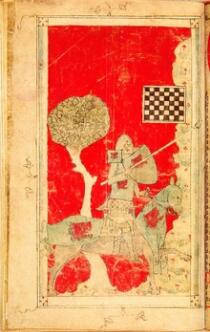Veldekes work must be regarded as an achievement of the first order. Not only did he rework a concise Latin biography of Servatius in an equally elaborate and colourful style - the first to do so in a Germanic language - he did this in over six thousand flawless, pairwise rhyming verses, a form that would continue to dominate the literature of the Low Countries for many centuries.
Hendrik wrote his life of a saint on commission for Countess Agnes van Loon and a certain Hessel. He was treasurer at the Servatius Church in Maastricht and administrator of the hospital where pilgrims spent the night on their way to the shrine of Servatius. It is not hard to imagine that Veldeke’s text would have been read out to them. But the poet seems to have had a much wider audience in mind for his saint’s biography: the words he uses in his rhymes are almost exclusively – and it must have been quite some feat – ones that could be converted fluently into High German dialects. However, there is no decisive evidence that the Legend of Saint Servatius was disseminated elsewhere in the German empire.
As is customary in the medieval lives of saints, the Legend of Saint Servatius consists of two parts: the actual life history and the story of Servatius’ informal canonisation and the miracles he performed after his death.
Although Servatius is from Armenia, he was sent by an angel to Tongeren to occupy the vacant bishop’s seat. But the godless Tongerens drove him from the city, so he, as a hermit, proceeded to live a secluded life in Maastricht. When, in a vision, he sees the arrival of Attila and the Huns, he departs on a pilgrimage to Rome to beg God to prevent this disaster. However, God abides by his decision. But the apostle Peter hands Servatius a silver key in a vision as a sign that he, like the apostle, now has the power to judge, punish and forgive even the greatest sinners. Upon his return to Tongeren, Servatius cannot save the citizens from the impending doom, but he can save the souls of those who allow themselves to be converted. Shortly after, Servatius dies in Maastricht, clothed in an aura of holiness.
In the second part of the Life, we read about how Servatius’ bones are disinterred and placed in a precious shrine. He turns out to be a powerful saint who can heal the sick, restore justice and even pull sinners from the jaws of hell. He is also ferocious when his rights (that is, those of his chapter) are not respected.
Veldeke ends the book with a prayer asking that Servatius put in a good word at the throne of God for his audience, himself and his patrons.




